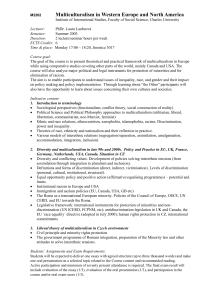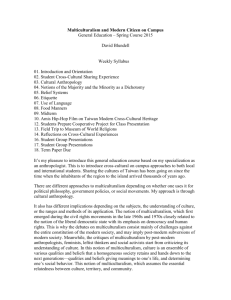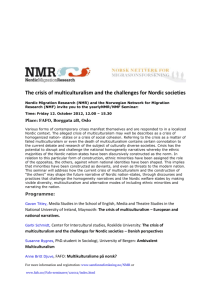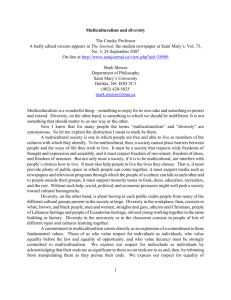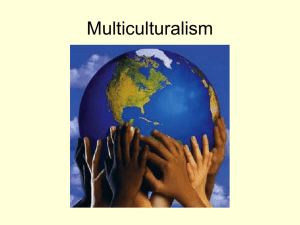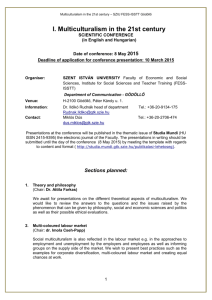Multiculturalism, Identity & Diversity
advertisement
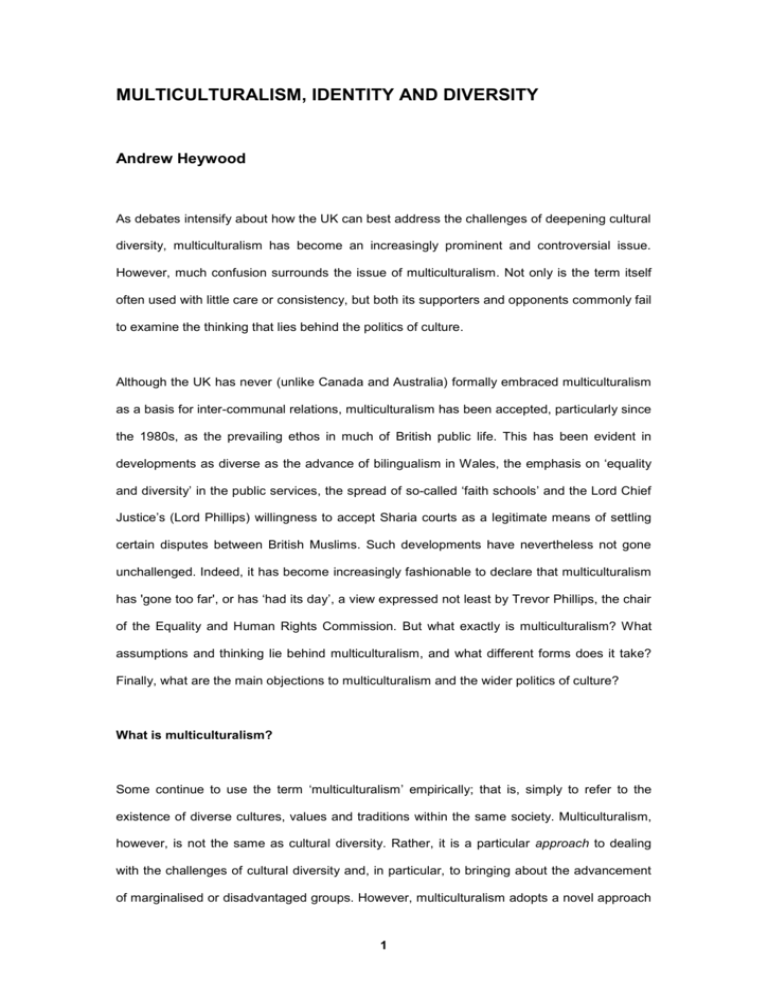
MULTICULTURALISM, IDENTITY AND DIVERSITY Andrew Heywood As debates intensify about how the UK can best address the challenges of deepening cultural diversity, multiculturalism has become an increasingly prominent and controversial issue. However, much confusion surrounds the issue of multiculturalism. Not only is the term itself often used with little care or consistency, but both its supporters and opponents commonly fail to examine the thinking that lies behind the politics of culture. Although the UK has never (unlike Canada and Australia) formally embraced multiculturalism as a basis for inter-communal relations, multiculturalism has been accepted, particularly since the 1980s, as the prevailing ethos in much of British public life. This has been evident in developments as diverse as the advance of bilingualism in Wales, the emphasis on ‘equality and diversity’ in the public services, the spread of so-called ‘faith schools’ and the Lord Chief Justice’s (Lord Phillips) willingness to accept Sharia courts as a legitimate means of settling certain disputes between British Muslims. Such developments have nevertheless not gone unchallenged. Indeed, it has become increasingly fashionable to declare that multiculturalism has 'gone too far', or has ‘had its day’, a view expressed not least by Trevor Phillips, the chair of the Equality and Human Rights Commission. But what exactly is multiculturalism? What assumptions and thinking lie behind multiculturalism, and what different forms does it take? Finally, what are the main objections to multiculturalism and the wider politics of culture? What is multiculturalism? Some continue to use the term ‘multiculturalism’ empirically; that is, simply to refer to the existence of diverse cultures, values and traditions within the same society. Multiculturalism, however, is not the same as cultural diversity. Rather, it is a particular approach to dealing with the challenges of cultural diversity and, in particular, to bringing about the advancement of marginalised or disadvantaged groups. However, multiculturalism adopts a novel approach 1 to such matters, one that departs from conventional approaches to social advancement, especially as represented by republicanism and social reformism. Republicanism (associated with classical liberalism) is primarily concerned with the problem of legal and political exclusion, the denial to certain groups of rights that are enjoyed by their fellow citizens. The key idea of republicanism is the principle of universal citizenship, the belief that all members of society should enjoy the same status and the same entitlements. Republican thinking was, for example, reflected in first-wave feminism, in that its campaign for female emancipation focused on the struggle for votes for women and on equal access to education, careers and public life in general. It is also evident in anti-discrimination legislation, such as the Race Relations Act (1976), which prohibits discrimination on the grounds of race, colour and ethnic or national origin. Republicanism can, in this sense, be said to be 'difference-blind': it views difference as 'the problem' (because it leads to discriminatory or unfair treatment), and proposes that difference be banished or transcended in the name of equality. Republicans therefore believe that social advancement can be brought about through legal egalitarianism. Social reformism (associated with modern liberalism or social democracy) arose out of the belief that universal citizenship and formal equality are not sufficient, in themselves, to tackle the problems of subordination and marginalisation. People are held back not merely be legal and political exclusion, but also, and more importantly, by social disadvantage - poverty, unemployment, poor housing, lack of education, and suchlike. The key idea of social reformism is the principle of equality of opportunity, the belief in a ‘level playing-field' that allows people to rise or fall in society strictly on the basis of personal ability and their willingness to work. Such social egalitarianism can only be brought about through a system of social engineering that aims to alleviate poverty and overcome disadvantage, in part through the identification of difference. For instance, the stress in the Race Relations Act (2000) on the promotion of equal opportunities forces schools, colleges and universities formally to monitor issues such as staff recruitment and promotion and student performance on the basis of ethnic or racial origin. This, nevertheless, amounts to only a provisional or temporary 2 acknowledgement of difference, in that different groups are identified only to expose (supposedly) unfair practices and eradicate them. Multiculturalism, for its part, developed out of the belief that group marginalisation often has yet deeper origins. It is not merely a legal, political or social phenomenon, but is, rather, a cultural phenomenon, one that operates through stereotypes and values that structure how people see themselves and are seen by others. Universal citizenship and equality of opportunity, in other words, do not go far enough. Egalitarianism, in both its legal and social forms, has limited value, and may even be part of the problem. Multiculturalism, by contrast, is distinguished by an emphasis on difference over equality. This is reflected in its central theme: a positive endorsement, even celebration, of cultural difference, allowing marginalised groups to assert themselves by reclaiming an authentic sense of cultural identity. Multicultural rights are therefore specific to the group concerned, as opposed to ‘equal’ or ‘universal’ rights. They include: The right to (public) recognition and respect. Cultural groups, defined by characteristics such as religion, language, ethnicity or national origin, should somehow be accepted as legitimate actors in public life. Such rights may include the right not to be offended, protecting the sacred or core beliefs of a group from being attacked or insulted. Minority, 'special' or 'polyethnic' rights. These are legal privileges or exclusions that enable particular cultural groups to maintain their identities and their distinctive ways of life. (Examples in the UK include the exclusion of Sikhs from the requirement to wear motor-cycle helmets, the exclusion of Jewish shopkeepers from Sunday trading legislation, and exemptions for Muslim and Jewish butchers from laws regulating the slaughter of animals and birds.) The right, in certain circumstances, to some degree of self-determination. This enables groups to exert some control, or at least influence, over the rules by which they live. Liberal multiculturalists, such as Will Kymlicka (1995), tend to restrict the right to self- 3 determination to indigenous peoples and tribes (who have become minority groups through conquest or colonialism), excluding minority groups that have developed as a result of immigration (where some level of consent can be assumed). Contrasting approaches to social advancement Approach Republicanism Social reformism Multiculturalism Main obstacle to advancement Legal and political exclusion Social disadvantage Cultural marginalization Key theme Universal citizenship Equality of opportunity Group selfassertion Attitude to difference Differenceblindness – politics of indifference Manifestations Difference highlighted, but in order to 'transcend' Celebrate difference – difference is permanent and ineradicable Formal equality (legal and political rights) Ban discrimination Prohibit use of ethnic/cultural categories (France) Social rights Welfare and redistribution Positive discrimination (?) Right to (public) recognition and respect Minority (polyethnic) rights Group selfdetermination (?) The politics of cultural self-assertion Multiculturalism has been shaped by a larger body of thought that holds that culture is basic to political and social identity. In that sense, multiculturalism is part of a wider politics of cultural self-assertion. The origins of this form of politics can be traced back to the counterEnlightenment and, in particular, the ideas of the German poet and philosopher, Herder (1744-1803), often portrayed as the 'father' of cultural nationalism. However, in its modern form, cultural politics has been shaped by two main forces: identity politics and communitarianism. Identity politics is a broad term that encompasses a wide range of political trends and ideological developments. What all forms of identity politics have in common is that they view liberal universalism as a source of oppression, even a form of cultural imperialism, which 4 tends to marginalise and demoralise subordinate groups and peoples. It does this because, behind a façade of universalism, the culture of liberal societies is constructed in line with the interests of its dominant groups – men, whites, the wealthy and so forth. Subordinate groups and peoples are either consigned an inferior or demeaning stereotype or they are encouraged to identify with the values and interests of dominant groups, their oppressors. Edward Said (2003) tried to expose this through the notion of ‘orientalism’, highlighting the extent to which European colonialism had been upheld through stereotypical fictions that belittled and demeaned non-western people and culture. However, identity politics also views culture as a source of liberation and empowerment. Social and political advancement can be achieved through a process of cultural self-assertion aimed at cultivating a 'pure' or 'authentic' sense of identity. Embracing such an identity is therefore a political act, a statement of intent, a form defiance. This is what gives identity politics its typically combative character and imbues it with considerable psycho-emotional force. Identity politics fuses the personal and the political. Identity politics Identity politics is a style of politics that seeks to advance the interest of a particular group, in the face of actual or perceives injustice, oppression or marginalisation, by strengthening its members’ awareness of their collective identity and common experiences. Many 'new' social movements and ideologies can be seen as part of a larger trend towards the politics of identity. These include second-wave feminism, the gay liberation movement, the disabilities rights movement, multiculturalism. ethnic and cultural nationalism, religious fundamentalism and The rise of identity politics is widely viewed as a consequence of the breakdown of conventional class and ideological solidarities, and particularly of the decline of universalist philosophies, especially liberalism and socialism (in its various forms) to ones that practice the ‘politics of difference’, highlight the importance of factors such as gender, ethnicity, race, nationality, culture and religion. 5 Communitarianism is the belief that the self or person is constituted through the community, in the sense that individuals are shaped by the communities to which they belong and thus owe them a debt of respect and consideration. Communitarianism arose as a philosophical revolt against liberal universalism, the belief that, as individuals, people in all societies and all cultures have essentially the same 'inner' identity. Communitarian philosophers such as Alisdair MacIntyre (1981) and Michael Sandel (1982) portrayed this idea of the abstract individual – the 'unencumbered self' – as a recipe for rootless atomism. Instead, individuals must be embedded in a particular social, institutional, moral or ideological context, as only 'external' factors are able to give people a genuine sense of moral identity and purpose. During the 1980s and 1990s a major debate raged in philosophy between liberals and communitarians, one of the consequences of which was a greater willingness amongst many liberal thinkers to acknowledge the importance of culture. This, in turn, made liberalism more open to the attractions of multiculturalism. Varieties of multiculturalism One of the myths of multiculturalism is that it is merely a political stance: the belief that cultural diversity should be recognised or even celebrated. Rather, it is an ideological space which encompasses a variety of approaches to the challenge of diversity. All forms of multiculturalism are characterised by a belief in 'diversity within unity', the idea that the public recognition of cultural difference can and should be contained within a single political society. However, rival multiculturalist traditions are divided over the respective importance of diversity and unity. The most important of these traditions are: Liberal multiculturalism Pluralist multiculturalism Cosmopolitan multiculturalism Liberal multiculturalism is a complex ideological phenomenon. It amounts to an attempt by liberals to distance themselves from universalism and, as far as possible, embrace pluralism. 6 This has largely been done by embracing the idea of moral neutrality, the notion that liberalism does not prescribe any particular set of values but allows individuals and groups to make their own moral decisions. Nevertheless, this diversity tends to be 'diversity within a liberal framework', as liberals find it difficult and perhaps impossible to endorse cultural practices that are in themselves illiberal and oppressive. Moreover, as liberals generally stress the importance of civic unity, they tend to argue that diversity should be confined to the ‘private’ sphere, leaving the ‘public’ sphere as a realm of integration. Finally, liberals believe that liberal democracy has the unique advantage that it protects personal autonomy and thus offers the only political system in which diversity can be protected. Pluralist multiculturalists place a greater emphasis on diversity than on unity. Diversity is a viewed as value in itself, based on an acceptance of value pluralism, the idea that different moral beliefs – and therefore different cultures – are equally legitimate. Nevertheless, as pluralist multiculturalism is the form of multiculturalism that most clearly embraces identity politics, it is usually associated with attempts to defend 'oppressed' cultures and minority groups and has, at best, an equivocal relationship with liberalism. At the very least, it refuses to ‘absolutise’ liberalism, rejecting the idea that liberal values or liberal-democratic structures have any priority over their rivals. Pluralist multiculturalists also argue that only a strong and public recognition of cultural belonging enables people to participate fully in their society, thus embracing the idea of differentiated citizenship. Finally, multiculturalist ideas have been generated by theorists sympathetic to cosmopolitanism. Cosmopolitan multiculturalists have been particularly keen to defend the rights and cultures of indigenous peoples, often within the parameters of the wider global justice movement. One of the characteristic themes of cosmopolitan multiculturalism is an emphasis on hybridity or multiple identities, the recognition that personal identity is complex and multifaceted. This, in turn, can lead to an emphasis on the merits of cultural mixing (evident, for example, in the idea of ‘world music’), seen as a way of broadening people's political horizons and ultimately providing the basis for global citizenship. Cosmopolitan multiculturalism has been portrayed as a kind of 'pick and mix’ multiculturalism, or as 7 'multiculturalism lite’, implying that cultural identity is more a lifestyle choice (or a series of lifestyle choices) than something that is deeply rooted in society and history. Types of multiculturalism Type Liberal multiculturalism Pluralist multiculturalism Cosmopolitan multiculturalism View of diversity Diversity within a liberal framework (must be compatible with toleration and autonomy) Diversity a value in its own right; all cultures equal, manifestations of different aspects of human nature Diversity strengthens hybridity (multiple identities); a postliberal stance, but must be compatible with global justice Basis for integration Cultural diversity contained by overarching civic unity – universal citizenship within context of liberal democracy Key criticisms Preserves dominance of western liberalism; denies legitimacy of non- or anti-liberal cultures Sense of cultural belonging provides basis for civic participation – differentiated citizenship, recognizing polyethnic and other rights Cultural mixing promotes an awareness of other peoples and of the wider world – global citizenship Results in plural monoculturalism and absence of civic cohesion A 'pick and mix' multiculturalism that undermines cultural distinctiveness and weakens cultural authenticity Objections to the politics of cultural self-assertion The 'cultural turn' in politics has not been without its critics, however. Cultural politics has been criticised from a variety of perspectives which, in turn, have generated specific attacks on multiculturalism. The most significant of these criticisms include the following: Culture as reductionism Culture as captivity Culture as conflict Sociologists and others have questioned whether cultural groups can ever be seen are meaningful political entities, since cultures themselves are never homogeneous but are always complex, differentiated and fluid. Cultural politics is therefore based on a reductionist view of culture, in that it defines cultural membership in terms of a supposedly dominant 8 characteristic and implies that the people who share that characteristic belong to the same ‘community’. Critics have therefore argued that there is not such thing as, say, the ‘Muslim community’ or the ‘Somali community’, any more than there is a ‘gay community’. ‘Communities’, in this sense, are political inventions, imagined communities not organic or living comunities. Culture may also be viewed as a form of oppression or captivity. This is a view advanced by universalist liberals, who portray cultural politics as a personal and political dead-end. This applies because culture is very largely passed down from one generation to the next through a process of socialisation. Unless it is based on free and informed choice (which is rarely the case), cultural identity amounts to an affront to individuality and personal autonomy; it reflects what J. S. Mill called the 'despotism of custom'. In the feminist version of a similar argument, multiculturalism is seen as little more than a concealed attempt to bolster male power, as the cultural beliefs it seeks to preserve or strengthen are all too often deeply patriarchal. The politics of cultural recognition may therefore be used to legitimise continued female subordination. Finally, cultural politics has been associated with division and conflict. Such thinking has been expressed in two contrasting critiques of multiculturalism. First, nationalists, and particularly conservative nationalists, have taken issue with the core multiculturalist idea that increased cultural diversity does not threaten political unity. For nationalists, the unrivalled capacity of the nation to provide the basis for legitimate political rule stems precisely from the fact it ensures that cultural identity and political identity overlap. In this view, multiculturalism is a recipe for civic strife and political instability. The second version of this argument is advanced by socialists, who argue that the politics of cultural recognition undermines the idea of a common humanity, limiting people's sense of moral responsibility to members of their own cultural group. Such a tendency tends to undermine support for the politics of welfare and redistribution, which relies on a wider and ‘difference-blind’ sense of altruism across society. References and further reading 9 Goldberg, T. (ed.) Multiculturalism: A Critical Reader (Blackwell, 1995). Heywood, A. ‘Liberalism, Toleration and Diversity’ (Politics Review, September 2008, 18/1). Kymlika, W. Multicultural Citizenship (Oxford University Press, 1995). MacIntyre, A. After Virtue. (University of Notre Dame Press, 1981). Modood, T. Multiculturalism. (Polity Press, 2007). Parekh, B. Rethinking Multiculturalism: Cultural Diversity and Political Theory (Palgrave Macmillan, 2005). Parekh, B. The New Politics of Identity; Political Principles for an Independent World (Palgrave Macmillan, 2008). Said, E. Orientalism (Penguin, 2003). Sandel, M. Liberalism and the Limits of Justice (Cambridge University Press, 1982). Taylor, C. et al, Multiculturalism (Princeton University Press, 1994). West, P. The Poverty of Multiculturalism (The Institute for the Study of Civil Society, 2005). Andrew Heywood is a leading writer of politics textbooks and an A Level Chief Examiner in Government and Politics. His recent books include Essentials of UK Politics (2008), Politics (2007), Political Ideologies (2007) and Political Theory (2004). 10
